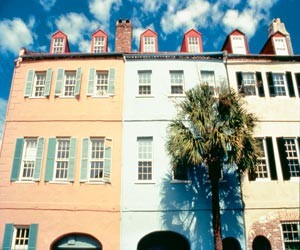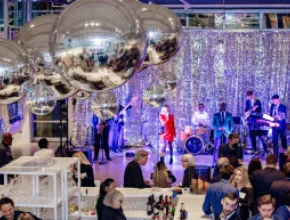Group-friendly properties, wonderful golf courses and waterborne pursuits are among the attributes that make the Palmetto State—comprising Atlantic coastal and inland areas—a meetings standby in the Southeast. Add a large helping of laid-back Southern charm and perhaps some barbecue, and attendees won’t soon forget their time in South Carolina.
"The state of South Carolina is very fortunate to be able to offer such vast diverseness in landscape and culture, from the mountains to the coastline," says Danna Lilly, director of sales at the Myrtle Beach Area CVB.
The state is indeed rich in culture, heritage and history, all of which are a snap to incorporate into group gatherings.
Coastal South Carolina
Charleston’s slogan, according to Gloria Clarke, sales manager at the Charleston Area CVB, is "Where History Lives."
"It’s appropriate because although we are known for history, the city is very much alive and breathing," she says. "There is so much to do. No other place can compare, and as far as U.S. destinations go, this is among the most historic and has a very European vibe."
Clarke adds that the Charleston area, which is set on the Atlantic Ocean and encompasses the resort islands of Kiawah, Seabrook and Isle of Palms, boasts unique architecture, upscale shopping, golf opportunities and terrific culinary offerings.
"Charleston has all the right ingredients for a group destination," she says.
And most planners want to make sure their attendees experience the special "Charleston feel" that incorporates the area’s history, Clarke adds.
Among the ways to do so are tours of Fort Sumter National Monument, the site where the Civil War began, via SpiritLine Cruises; tours of the area’s historic plantations; tours of Charleston’s historic downtown district via Palmetto Carriage Works; and basket-weaving classes with Sweetgrass Baskets, which celebrates this traditional art form that’s been thriving in Charleston for more than 300 years.
Meeting in an atmospheric hotel filled with historic charm is another way to soak up the local flavor, with options including Francis Marion Hotel, Doubletree Guest Suites Historic Charleston and Charleston Place.
Hilton Head Island, the first eco-planned resort development in the U.S., has maintained its natural setting while offering all the modern technology groups require at affordable rates, according to Jack Reed, director of sales at the Hilton Head Island-Bluffton COC.
"While great beaches and world championship golf remain leading attractions, superb conference facilities and meeting packages also serve to draw millions of annual visitors," he says, citing a current group offer that includes one complimentary room for every 25 paid rooms.
When on the island, visitors are in for a culturally rich and diverse experience, Reed adds.
"The island’s splendid beauty and rich history have inspired a vibrant arts and cultural community normally found in larger metropolitan areas," he says.
One venue available for a cultural experience is the Arts Center of Coastal Carolina, a multimillion-dollar fine arts facility that showcases some of the country’s most renowned visual and performing artists. Broadway-style theater, pop, jazz, classical concerts and gallery exhibitions are all found on the center’s calendar of events.
Originally descended from African slaves who worked the Southern plantations, the Gullah people of the Lowcountry and nearby coastal areas of South Carolina and Georgia are the most culturally distinctive African-American population in the U.S., Reed adds.
Groups meeting on Hilton Head Island in February are welcome to attend the annual Native Islander Gullah Celebration, featuring arts, crafts, history, music and food of the Gullah people. Other opportunities to experience Gullah culture include Gullah-N-Geechie Mahn Tours, Gullah Heritage Trail Tours and music by the Hallelujah Singers.
Old Town Bluffton was the first town developed in southern Beaufort County. The Heyward House, an 1840s example of an early Carolina farmhouse, is the town’s official Welcome Center. Open Wednesday through Saturday, it’s a great place to start a group tour of the National Register Historic District, Reed says.
Locally known as the Grand Strand, the Myrtle Beach area features more than 20 hotels with dedicated meeting and function space. According to the Myrtle Beach Area CVB’s Lilly, planners can book everything from relaxing resorts and tree-shaded golf villas to historic plantations for group gatherings.
"Plus, we have live-entertainment theaters, delicious Carolina cuisine, championship golf, incredible shopping, endless entertainment options and 60 miles of wide sandy beaches—all these choices are what sets Myrtle Beach apart as a group destination," Lilly says.
To enjoy the unique heritage of the area, groups might take a guided tour of Brookgreen Gardens, featuring the world’s most significant collection of figurative sculpture in an outdoor setting by American artists, or plan an outing with Grand Strand Culinary Tours, which facilitates several restaurant tour packages designed for groups of 20 to 50 people.
According to Lilly, tour guides educate visitors about how Spaniards and Huguenots, revolutionists and patriots, and slaves and plantation owners all cultivated and contributed to the unique cuisine of the Myrtle Beach area.
"Tours vary from a simple traditional lunch in Myrtle Beach to a walking culinary adventure in historic downtown Conway," she says.
Inland South Carolina
Columbia, the state capital, is an easily accessible drive- and fly-to Southeast destination. According to Nicole Smith, director of media relations and publications for the Midlands Authority for Conventions, Sports & Tourism, area attractions and standby properties such as Sheraton, Marriott, Holiday Inn and Radisson are available for groups at a noticeable value.
"In Columbia you get great quality at an unbelievable price," she says.
One of the best ways groups can incorporate culture into their itineraries, Smith adds, is by meeting at one of Columbia’s historic meeting facilities, such as Canal & Senate, a venue on the Congaree River.
"The group incorporated Southern barbecue, bluegrass and Firefly vodka into the event," Smith says. "Guests enjoyed Southern hospitality at its finest."
Smith encourages planners to work with the Columbia Metropolitan CVB and the Historic Columbia Foundation to find the historic home or building that is best-suited for a group gathering.
"The Historic Columbia Foundation also provides tours of our historic homes and gardens, buildings and neighborhoods," she adds. "Groups can also tour our State House and grounds or our Governor’s Mansion."
Columbia’s heritage can also be enjoyed via the city’s dining scene, which is diverse and often authentically Southern.
"We love barbecue, shrimp and grits, fried green tomatoes and good old-fashioned home cooking," Smith says, citing several restaurants groups might check out, including Blue Marlin, Palmetto Pig, Mr. Friendly’s, Gervais & Vine, Lizard’s Thicket and Villa Tronco, which is more than 100 years old.
When meeting in Greenville, planners should make time for the group to visit Heritage Green, an urban arts and cultural campus in the heart of downtown, featuring facilities that offer arts, learning and entertainment. The campus is home to the Greenville County Museum of Art, the Greenville Little Theatre, the Upcountry History Museum and the Museum & Gallery at Heritage Green.
Art Crossing on the banks of the Reedy River is another cultural option for groups convening in Greenville. One section of Art Crossing features the individual studios of 13 artists, and in another area eight more artists work in a group space called Suite 201. The public is invited to watch the artists in action. Paintings in oils, acrylic and watercolor, as well as drawings, sculptures, jewelry, photography, furniture, weavings and ceramics are among the works available for purchase.
While Clemson’s rich heritage is tied in large part to Clemson University, Ruthie Millar, membership director of the Clemson Area COC, suggests planners also give the Pendleton Historic Foundation a call regarding incorporating two of the area’s historic attributes into a group itinerary.
The historic Ashtabula and Woodburn houses in Pendleton, S.C., are among the few remaining antebellum plantation houses built in the 19th century, when Pendleton was a favorite summer retreat for wealthy Charleston families, according to Millar.
"The common thread between these two houses is that they both were owned by members of the prestigious Adger family of Charleston," she says, adding the two houses are on the National Register of Historic Places, and they’re both available for receptions.
Groups meeting in Clemson might also visit the Pickens County Museum of Art and Histories, whose purpose is to exhibit and interpret the artifacts, antiquities and archival, cultural and natural history of the county and surrounding geographic region.
"The museum shop features a wide array of fine, traditional and folk artisans that represent an artistic spectrum from classical to homespun," Millar adds.
The Rock Hill and York County area of the state is an accessible, affordable and authentically Southern experience, according to Sonja R. Burris, communications and meetings coordinator at the Rock Hill/York County CVB.
"Meetings and conference groups enjoy personal attention and value," she says. "York County as an affordable alternative nestled within an authentic Southern environment."
History envelops the area, including Kings Mountain State Park and Kings Mountain National Military Park. The former features a living history farm that tells the story of an upcountry farm of the 1850s, and the latter has battlefield trails, hiking trails and a museum of period artifacts.
Among the destination’s group-friendly historic venues for off-site events is Hightower Hall at Historic Brattonsville, a 778-acre site that served as a historic backdrop for the Revolutionary War film The Patriot, starring Mel Gibson. Hightower Hall, which was recently renovated to restore some of the house’s antebellum architectural splendor, is a popular location for receptions, parties and Civil War battle reenactments.
Additionally, the Ye Iswa, or People of the River, invite groups to experience Native American culture at Catawba Indian Reservation. The reservation features the Catawba Long House, which accommodates group gatherings, an archeological site, historic exhibits, an archives center, a picnic area, a view of the Catawba River and a gift shop where attendees can purchase Catawba pottery.
In Spartanburg, according to Amy Phillips, spokesperson for the Spartanburg CVB, there are more Revolutionary War sites than anywhere in the world, and local historians are available to facilitate tours through the city’s six historic districts.
"You could basically say that independence started here, and if you look into our past you will see also how our rich heritage and culture have transcended the centuries," she says, explaining the area’s Scotch-Irish traditions have thrived since Revolutionary times.
For groups of any size, a must-visit is the Chapman Cultural Center, which houses Spartanburg’s History Museum, Art Museum and Science Museum.
Planners are also encouraged to check out the calendars at Hub-Bub Showroom, HomeSpun Bluegrass and Spartanburg’s three Opry Houses for live music options.
"With 23 art museums to choose from and the oldest Artist Guild in South Carolina, a definite stop would be the Carolina Foothills Artisan Center," Phillips adds. "This culture shop showcases and sells some of the best local art in the state. It is located on scenic Highway 11, so the trip to and from takes you along a beautiful route with opportunities for other outings along the way."
It’s also worth noting that Hub City Train Museum is under construction and scheduled to open in December. It will feature the history of trains in Spartanburg County and highlight the relevance of rail then and now.






